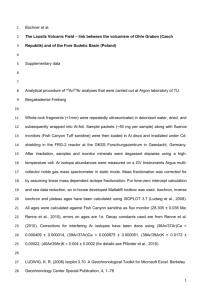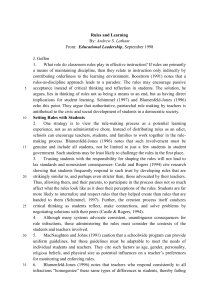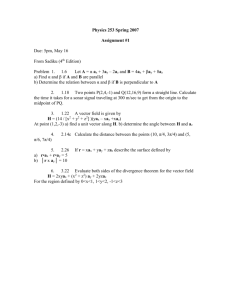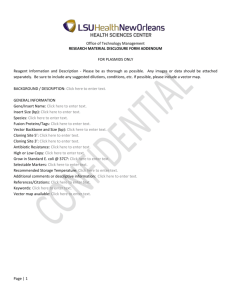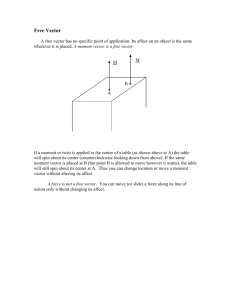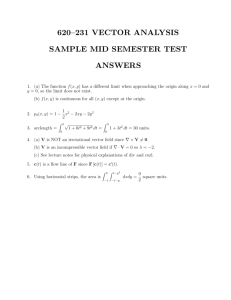Hints for Code Optimization
advertisement
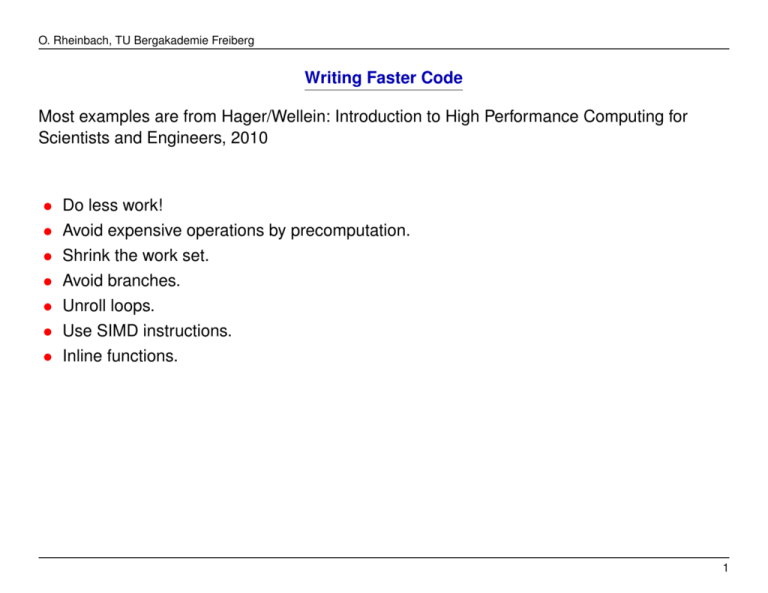
O. Rheinbach, TU Bergakademie Freiberg
Writing Faster Code
Most examples are from Hager/Wellein: Introduction to High Performance Computing for
Scientists and Engineers, 2010
•
•
•
•
•
•
•
Do less work!
Avoid expensive operations by precomputation.
Shrink the work set.
Avoid branches.
Unroll loops.
Use SIMD instructions.
Inline functions.
1
O. Rheinbach, TU Bergakademie Freiberg
Do less Work: Implement a cheaper, mathematically equivalent expression
Linear algebra: Consider A ∈ IRm×n, B ∈ IRn×o, v ∈ IRo
a11
A · B · v = ...
am1
...
...
...
a1n
b11
... ...
bn1
amn
...
...
...
b1o
...
bno
v1
... .
vo
a) Computing
(A · B)v
uses m · o · n flops to compute the m × o-matrix C = A · B and, additionally,
m · o flops to compute C · v =⇒ Total flops m · o · (n + 1).
b) Computing instead
A · (Bv)
needs n · o flops to compute the vector w = Bv of length n and, additionally,
m · n flops to compute the vector A · w of length m =⇒ Total flops n · o + m · n.
=⇒ For n ≈ m ≈ o we have O(n3) flops for the slow version vs. O(n2) flops for the fast
version!
2
O. Rheinbach, TU Bergakademie Freiberg
Do less Work: Rearrange Code in Loops
Rearrange code to eliminate operations.
int i, FLAG = 0;
for (i = 0; i < N; i++) {
if (complex_func(i) < THRESHOLD) {
FLAG = 1;
}
}
If, on average, the boolean expression is true for many array elements, exitig the loop early
can save many unnecessary instructions.
int i, FLAG = 0;
for (i = 0; i < N; i++) {
if (complex_func(i) < THRESHOLD) {
FLAG = 1;
break;
}
}
3
O. Rheinbach, TU Bergakademie Freiberg
Do less Work: Eliminate Common Subexpressions
Subexpressions, particularly containing strong operations, are sometimes better precomputed
and stored. Example: loop-invariant code motion
int i;
double A[N], x, s, r;
for (i = 0; i < N; i++) {
A[i] = A[i] + s + r*sin(x);
}
int i;
double A[N], x, s, r, tmp;
tmp = s + r*sin(x);
for (i = 0; i < N; i++) {
A[i] = A[i] + tmp;
}
Note: Compilers often fail to make such optimizations. Caveat: Modified code will in general
not yield bitwise identical results.
Sometimes mathematically equivalent rearrangements may affect numerical stability, see, e.g.
modified Gram-Schmidt vs. Gram-Schmidt.
4
O. Rheinbach, TU Bergakademie Freiberg
Avoiding expensive operations: “Strength Reduction”
Calls like
int i=2;
y=pow(x,i);
will, most likely, not be optimized by the compiler. If always i = 2 then
y = x ∗ x;
will be much faster!
5
O. Rheinbach, TU Bergakademie Freiberg
Avoiding expensive operations: Precompute!
Strong operations: division, transcendental functions, etc.; can take hundreds of clock cycles
(remember: sin/cos 50-200 clock cycles).
Weak operations: cheaper alternatives.
int iL, iR, iU, iO, iS, iN;
double edelz, tt, BF;
// inside some expensive loop:
edelz = iL+iR+iU+iO+iS+iN;
BF = 0.5*(1.+tanh(edelz/tt)); // expensive operation
Precomputed table look-up needs no further computation; data fits in L1 cache.
int iL, iR, iU, iO, iS, iN, i;
double tt, BF, tanh_table[13];
// precompute table once and for all
for (i = 0; i <= 13; i++)
tanh_table[i] = 0.5*(1.+tanh((i-6.)/tt));
// ... //
// usage of table data inside some expensive loop:
BF = tanh_table[iL+iR+iU+iO+iS+iN+6];
6
O. Rheinbach, TU Bergakademie Freiberg
Shrink the Working Set
Shrink the working set such that it may fit into L1/L2 or L3-cache.
Working Set := Amount of memory accessed during a significant portion (e.g. an iteration) of
an algorithm.
Helps to
• increase number of cache hits
• may eliminate swapping to disk (not allowed in supercomputers anyway)
Note that the use of shorter data types (i.e. short int, char, or bits in an int to store
several flags instead of using several bool may save memory but will/may affect performance.
For example alignment (dt. “Speicherausrichtung”) issues can occur: Typically processors are
fastest at accessing data that is aligned according to the processor word, i.e. a data type
should be stored at an address that is a multiple of the word size.
Compilers can/will take care of this, e.g., by padding data structures with zeros. But this may
annihilate the attempts to reduce the size of a data structure in memory.
7
O. Rheinbach, TU Bergakademie Freiberg
Avoid Branches!
Tight loops: loops containing few operations. Ideal candidates for pipelining or loop unrolling.
Compiler cannot do this in presence of branch statements. Branch prediction can guess
wrong branch (branch miss), ! pipeline flush.
Instead of a single outer loop with branches inside (left) use several outer loops with no
branches (right).
int i, j, sign;
double A[N][N], B[N], C[N];
for (j = 0; j < N; j++) {
for (i = 0; i < N; i++) {
if (i >= j) {
sign = 1;
} else if (i < j) {
sign = -1;
} else {
sign = 0;
}
C[j] += sign*A[i][j]*B[i];
}
}
int i, j, sign;
double A[N][N], B[N], C[N];
for (j = 0; j < N; j++) {
for (i = j+1; i < N; i++) {
C[j] += A[i][j]*B[i];
}
}
for (j = 0; j < N; j++) {
for (i = 0; i < j; i++) {
C[j] -= A[i][j]*B[i];
}
}
8
O. Rheinbach, TU Bergakademie Freiberg
Use of SIMD Instructions
Vector instructions/units on recent CPUs (MMX, SSEn, AVX). Smaller data type can double
execution speed (float vs. double). No improvement will be obtained for memory-bound code.
Example loop unrolling:
float r[N], x[N], y[N];
for (i=0; i<N; i++)
r[i] = x[i] + y[i];
Each loop iteration independent, no branches.
Collect several iterations into group whose data fits in one SIMD register.
Finish with any necessary remainder pass.
Alignment issues exist.
9
O. Rheinbach, TU Bergakademie Freiberg
Use SIMD Instructions (2)
// Pseudocode of a vectorized loop
rem = N % 4
for (i=0; i<N-rem; i+=4) {
"load R1 = [ x[i] x[i+1] x[i+2] x[i+3] ];"
"load R2 = [ y[i] y[i+1] y[i+2] y[i+3] ];"
// SIMD add of 4 packed SP in 1 cycle
"R3 = add(R1,R2);"
"store [ r[i] r[i+1] r[i+2] r[i+3] ] = R3;"
}
// remainder is done sequentially
for (i=N-rem; i<N; i++) r[i] = x[i] + y[i];
GCC will generate SSE instructions from floating point code if -mfpmath=sse is enabled. This
is the default choice for the x86-64 compiler and the “resulting code should be considerably
faster in the majority of cases” (man page).
10
O. Rheinbach, TU Bergakademie Freiberg
Use SIMD Instructions (3)
SSE on Intel CPUs: permit independent move of lo/hi 64 bits of SIMD register. Can mix scalar
loads/stores with SIMD arithmetic. Example: vector addition loop (pseudo code):
rem = N % 2;
for (i=0; i<N-rem; i+=2) {
// scalar loads
"load R1.lo = x[i];"
"load R1.hi = x[i+1];"
"load R2.lo = y[i];"
"load R2.hi = y[i+1];"
// packed addition
"R3 = add(R1,R2);"
// scalar stores
"store r[i] = R3.lo;"
"store r[i+1] = R3.hi;"
// remainder loop
if (rem==1) r[N] = x[N] + y[N];
11
O. Rheinbach, TU Bergakademie Freiberg
Use SIMD Instructions (4)
In a loop contains a dependency
for (i=1; i<N; i++) a[i] = s*a[i-1];
no SIMD acceleration will be done, i.e. compiler will reverts to scalar operation.
12
O. Rheinbach, TU Bergakademie Freiberg
Use SIMD Instructions (5)
• Use of SIMD/SSE is compiler specific. Can be achieved by compiler directives or inline
assembly code (not portable).
• Use of SSE can be checked by inspecting the assembly code.
• Some recent compilers. i.e. by MS) do not support inline assembly code. Here, usage of
“compiler intrinsics” is the only possibility. Compiler intrinsics such as byteswap uint64,
declaration
unsigned __int64 __cdecl _byteswap_uint64(unsigned __int64);
are fast but not portable.
• Usage of optimized linear algebra libraries (e.g. an optimized blas).
Remark: cdecl the standard C and C++ calling convention. Here, the parameters are
removed from the stack by the caller. As result functions with a variable number of arguments
are allowed, see e.g. printf, as opposed to stdcall. cdecl does not affect the C++
name mangling.
13
O. Rheinbach, TU Bergakademie Freiberg
Use SIMD Instructions (6)
typedef union {
int val[4];
__m128i vec;
} mmevec;
void simd2() {
int i, r[N], x[N], y[N], rem = N % 4;
mmevec a1, a2, a3;
for (i = 0; i < N-rem; i+=4) {
a1.vec = _mm_set_epi32(x[i], x[i+1], x[i+2], x[i+3]);
a2.vec = _mm_set_epi32(y[i], y[i+1], y[i+2], y[i+3]);
a3.vec = _mm_add_epi32(a1.vec, a2.vec);
r[i] = a3.val[0];
r[i+1] = a3.val[1];
r[i+2] = a3.val[2];
r[i+3] = a3.val[3];
}
for (i = N-rem; i < N; i++) {
r[i] = x[i] + y[i];
}
}
14
O. Rheinbach, TU Bergakademie Freiberg
Inlining functions!
Function calls have an overhead (i.e. jump to function address, create local variables on the
stack, return from function) that should be avoided for small functions that are called often.
Solution: Copy the code to all locations or use inline keyword, i.e. return the dimension of a
vector in C++
template <typename Number>
inline unsigned int Vector<Number>::size () const
{
return dim;
}
Note that the inline keyword is only a suggestion to the compiler.
Inlining may also make debugging more difficult as the function itself may not exist any more
“in its own right”. Calling the function from other object files is then also not possible (use
-fkeep-inline-functions).
15
O. Rheinbach, TU Bergakademie Freiberg
Inlining functions: Compiler Options
Related compiled options
-finline-small-functions
Integrate functions into their callers when their body is smaller
than expected function call code (so overall size of program gets
smaller). The compiler heuristically
decides which functions are simple enough to be worth integrating in this
Enabled at level -O2.
-finline-functions
Integrate all simple functions into their callers. The compiler
heuristically decides which functions are simple enough to be worth
integrating in this way.
If all calls to a given function are integrated, and the function
is declared "static", then the function is normally not output as
assembler code in its own right.
Enabled at level -O3.
16
O. Rheinbach, TU Bergakademie Freiberg
Inlining functions: More Compiler Options
-finline-functions-called-once
Consider all "static" functions called once for inlining into their
caller even if they are not marked "inline". If a call to a given
function is integrated, then the function
is not output as assembler code in its own right.
-fkeep-inline-functions
In C, emit "static" functions that are declared "inline" into the
object file, even if the function has been inlined into all of its
callers. This switch does not affect functions using the "extern
inline" extension in GNU C89.
In C++, emit any and all inline functions into the object file.
--param max-inline-recursive-depth-auto
Specifies maximum recursion depth used by the recursive inlining.
For functions declared inline
--parammax-inline-recursive-depth
is taken into account. For function not declared inline,
recursive inlining happens only when
-finline-functions (included in -O3) is enabled and
--param max-inline-recursive-depth-auto is used. The default value i
17
O. Rheinbach, TU Bergakademie Freiberg
Explicit Loop Unrolling (deal.II code)
Skalar product ⟨v, w⟩ implemented in C++ as
const_iterator ptr
vptr
eptr
while (ptr!=eptr) {
sum0 += (*ptr++
sum1 += (*ptr++
sum2 += (*ptr++
sum3 += (*ptr++
}
= begin(),
= v.begin(),
= ptr + (dim/4)*4;
*
*
*
*
*vptr++);
*vptr++);
*vptr++);
*vptr++);
// add up remaining elements
while (ptr != end())
sum0 += *ptr++ * *vptr++;
return sum0+sum1+sum2+sum3;
18
O. Rheinbach, TU Bergakademie Freiberg
Explicit Loop Unrolling (2)
Loop unrolling may help the compiler to generate efficient code.
Explicit and/or automatic loop unrolling (also using -funroll-loops will produce larger code
that may in return run slower, e.g. it may not fit into instruction cache.
The GNU compiler documentation warns that
-funroll-all-loops
Unroll all loops, even if their number of iterations is uncertain when the
loop is entered. This usually makes programs run more slowly.
-funroll-all-loops implies the same options as -funroll-loops,
Whether explicit loop unrolling is beneficial has to be tested for the specific combination
algorithm, compiler and processor. Due to more advanced compiler optimization as well as
advanced hardware it is less important than it used to be.
19
O. Rheinbach, TU Bergakademie Freiberg
Vector-2-Norm
√
Explicit Loop Unrolling and Inlining (deal.II code)
⟨v, v⟩ implemented in C++ as
const_iterator ptr = begin(),
eptr = ptr + (dim/4)*4;
while (ptr!=eptr) {
sum0 += ::sqr(*ptr++);
sum1 += ::sqr(*ptr++);
sum2 += ::sqr(*ptr++);
sum3 += ::sqr(*ptr++);
}
while (ptr != end()) // add up remaining elements
sum0 += ::sqr(*ptr++);
return sum0+sum1+sum2+sum3;
where sqr() is an inline function.
template <typename Number>
static inline Number sqr (const Number x) {
return x*x;
};
20
O. Rheinbach, TU Bergakademie Freiberg
Aliasing in C/C++!
Consider the following function
void scale_and_shift(double *a, double *b, double s, int n)
{
for(int i=1;i<n;i++)
{
a[i]=s*b[i-1];
}
}
In the standard case, i.e.,, if the memory of a and b do not overlap this loop can be vectorized.
However, if that is not the case, e.g. a == b then the loop exhibits a dependency
a[i]=s*a[i-1] which does not allow vectorization.
This is called aliasing since the same memory location may be accessed using the two
aliases a and b.
The compiler can not know in what way this function will be called and has to be conservative.
The loop can be unrolled by hand and a remark should be included in the documentation that
“the memory of a and b should not overlap”.
21
O. Rheinbach, TU Bergakademie Freiberg
Aliasing in C/C++!
Using the options
-fno-fnalias (Intel)
-fargument-noalias (GNU)
the compiler can be told that aliasing will not occur. If it still does, die code will give incorrect
results.
22
O. Rheinbach, TU Bergakademie Freiberg
C++-Optimizations: Avoiding Temporary Variables
Programming using a high level of abstraction often comes with a performance penalty
because of
• indirect access, e.g., in use of late binding, i.e. virtual function tables
• unnecessary temporary objects
• overloading of operator[] that may prevent SIMD vectorization.
23
O. Rheinbach, TU Bergakademie Freiberg
Reminder: C++-Templates
template<class T> class Vektor {
T* v;
int sz;
public:
Vektor();
T& getelement(int i) {
if(i>=0 && i<sz)
return v[i]
else
std::cout<<"Vektor error: Out of bounds:"<<i<<std::endl;
}
...
};
void main()
{
Vektor<int> v;
Vektor<std::string> s;
Vektor<int *> p;
...
}
24
O. Rheinbach, TU Bergakademie Freiberg
Reminder: C++ Standard Template Library
#include <vector>
using std;
vector<double> x[10];
x[0]=1;
cout << x[1]; // Achtung undefiniert:
// auch vector<> wird nicht automatisch initialisiert
cout << x.at(1);
// wirft eine Ausnahme
x push_back(3.141);
cout << x.size();
x.pop_back();
x.clear();
//
//
//
//
Ein Element x[10]=3.141 anfuegen
Die Laenge von x ausgeben (11)
Feld wieder um eins verkuerzen
Vektor leeren; Laenge auf 0
x.resize(20);
//
//
//
//
Die Laenge des Vektors auf 20 setzen
Achtung, wie push_back evtl. eine langsame Operation
da intern umkopiert werden muss
Reserviert internen Platz fuer Elemente
x.reserve(20);
vector<double> y;
y=x;
// kopiert alle Elemente
25
O. Rheinbach, TU Bergakademie Freiberg
Use Templates instead of Inheritance (if possible)
Classes are runtime polymorphism.
ParsingAlgorithm is an abstract base class from which parsers for certain data types are
inherited.
class TextParser
{
//...
public:
void Parse(ParsingAlgorithm *p);
//...
}
void FileParser::Parse(ParsingAlgorithm* p)
{
value = p->Parse(text);
}
Every call p->Parse(text) involves dereferencing p and then looking up the member function
Parse in the virtual function table.
26
O. Rheinbach, TU Bergakademie Freiberg
Use Templates instead of Inheritance (2)
Use compile time binding instead of runtime binding if possible.
Templates can be seen as compile time polymorphism or as a code generation tool. Here, the
Parser is parametrized using the template parameter Parser.
template <class Parser>
class TextParser
{
//...
public:
void Parse()
{
value = my_parser.Parse(text);
}
private:
Parser my_parser;
//...
}
Here, no pointer is dereferenced. Templates were invented to make C++ as fast as FORTRAN
always has always has been.
27
O. Rheinbach, TU Bergakademie Freiberg
Avoiding Temporary Objects
Example: Use operator += instead of operator + .
The possibility of operator overloading in C++ may mislead to use mathematical notation
when programming numerical algorithms.
struct Vec2D
{
union {
struct {
double x;
double y;
};
double val[2];
};
Vec2D(){};
Vec2D(double xx, double yy):x(xx),y(yy){ }
//...
28
O. Rheinbach, TU Bergakademie Freiberg
Avoiding Temporary Objects (2)
//...
Vec2D operator + (const Vec2D &p) const { return Vec2D(x+p.x,y+p.y); }
// uses temporary
Vec2D operator * (const double s) const { return Vec2D(s*x,s*y); } // nur p*2 ge
// uses temporary
Vec2D operator += (const Vec2D &p) { x+=p.x; y+=p.y; return *this; }
Vec2D operator *= (const Vec2D &p) { x*=p.x; y*=p.y; return *this; }
std::ostream & Write(std::ostream &o=std::cout) const
{ return o<<x<<" "<<y<<" "; }
}; // End of class declaration
29
O. Rheinbach, TU Bergakademie Freiberg
Avoiding Temporary Objects (3)
Although in printing speed it is not relevant a reference &p has been used for the parameter p.
This avoids copying the object. The reference has been declared const since it was not
introduced to modify p.
Note: For a very simple object like this (containing only two doubles) a copy may be as fast (or
faster) than a pointer or reference.
std::ostream & operator << (std::ostream & o, const Vec2D &p)
{
o.precision(7);
p.Write(o);
return o;
}
inline bool Vec2D::operator < (const Vec2D &p) const
{
return std::lexicographical_compare(val,val+2,p.val,p.val+2);
}
30
O. Rheinbach, TU Bergakademie Freiberg
Avoiding Temporary Objects (2)
Vec2D a(0,0),b(1,1),c(2,3);
c=2*a+b
Uses temporay objects for (2 ∗ a) and (2 ∗ a + b) whereas
Vec2D a(0,0),b(1,1),c(2,3);
c=a; c*=2; c+=b;
avoid temporary objects.
31
O. Rheinbach, TU Bergakademie Freiberg
Lazy Construction
Allocating and deallocating memory takes time, especially if it is initialized.
std::vector<double> v(1000);
switch(i)
{
case 1: /* */ break;
case 2: /* */ break;
/* */
case 10: std::copy(w.begin(),w.end(),v.begin()); break;
default: /* */ break;
};
Will allocate memory, initialize it using 0 and then values will be copied.
But of course remember: When programming an algorithm correctness is first, optimization is
last! Initialize all variables, use v.at(i) everywhere instead of v[i], etc.
32
O. Rheinbach, TU Bergakademie Freiberg
Lazy Construction (2)
switch(i)
{
case 1: /* */ break;
case 2: /* */ break;
/* */
case 10:
{
vector<double> v(w);
}
default: /* */ break;
};
// allocates and initializes using copy constructor
33
O. Rheinbach, TU Bergakademie Freiberg
Early/Static Construction
If the length of a vector is known and if it is known that it will be used often then an early or
even static construction may be the fastest option although it may be unelegant.
This is especially the case in Matlab which is lousy at dynamically growing vectors or
matrices.
{
static vector<double> v(1000);
std::copy(w.begin(),w.end(),v.begin()); break;
}
34
O. Rheinbach, TU Bergakademie Freiberg
The Curiously Recurring Template Pattern (CRTP)
The so-called CRTP is a technique to implement compile-time polymorphism
template<class Derived>
class Base
{
// methods within Base can use template to access members of Derived
};
class Derived : public Base<Derived>
{
// ...
};
The code of the base class is instantiated at compile time of the Derived class and therefore
is able to use/call functions of the Derived class without the use of virtual functions!
The function which is called is clearly determined at compile time and not at runtime (as in
polymorphism) but in many cases this is enough.
See also http://en.wikipedia.org/wiki/Curiously recurring template pattern
35
O. Rheinbach, TU Bergakademie Freiberg
Expression Templates
A technique which allows to use the easily readible expression as
c=s∗a+a∗b
without performance penalty. Here, a ∗ b means the component-wise multiplication.
The technique will lead to a call like
x = Vector< VecAdd<double, vector<double>, vector<double>> >(
VecAdd<double, vector<double>, vector<double>>(
Vector< double, VecScale<double, double, vector<double>> >(
VecScale<double, double, vector<double>>(c, x)),
Vector< double, VecMul<double, vector<double>, vector<double>> >)(
VecMul<double, vector<double>, vector<double>>(x, y))(x, y))
)
Note that the code will NOT be faster than good C or Fortran code. It rather serves to
eliminate performance penalties inherent in the C++ language.
The code will clearly be more difficult to debug for correctness and for performance!
36
O. Rheinbach, TU Bergakademie Freiberg
Dynamically Growing Arrays
C++ STL vectors can be grown dynamically efficiently, i.e., in almost linear time, i.e.,
vector<double> v;
for(int i=0;i<100000;i++)
v.push_back(i);
will be efficient.
Preallocating or reserving memory (i.e. v.reserve(100000)) will usually still make the code
faster.
Remark: In Matab
for i=1:100000
v(i)=i;
will be slow (even quadratic time in older versions of Matlab) but
v=zeros(1,100000);
for i=1:100000
v(i)=i;
will be fast.
37
O. Rheinbach, TU Bergakademie Freiberg
Use of Iterators Instead of Overloaded Operator [ ]
Although, in principle, this code could be vectorized by compilers currently may not.
template<class T> T sprod(const vector<T> a, const vector<T> b)
{
T res=T(0);
int s=a.size();
// to avoid calls to size()
for(int i=0;i<s;++i)
// ++i (for objects) in general faster than i++
{
res+=a[i]*b[i];
}
return res;
}
Calls const T & vector<T> :: operator [] for a and b. Although, in principle this could be
vectorized after inlining operator [] it is not.
38
O. Rheinbach, TU Bergakademie Freiberg
Use of Iterators Instead of Overloaded Operator[] (2)
Compilers do not have problems with SIMD vectorization in this version.
template<class T> T sprod(const vector<T> a, const vector<T> b)
{
typename vector<T>::const iterator a_it=a.begin(), b_it=b.begin();
T res=T(0);
int s=a.size();
// to avoid calls to size()
for(int i=0;i<s;++i)
// ++i (for objects) in general faster than i++
{
res+=a[i]*b[i];
}
return res;
}
Performance critical loops can be written in C or Fortran and be called from C++.
39
O. Rheinbach, TU Bergakademie Freiberg
Row major vs column major order
Fortran stores an two dimensional array column-wise (=column major order) whereas C/C++
use row-wise storage (=row major order).
C/C++ uses row major order, i.e
double a[m][n];
for(int i=0;i<m;++i)
for(int j=0;j<n;++j)
a[i][j]=i+j;
will access the memory using stride 1 which is good for locality.
Since Fortran uses column major order, in
do i=1,m
do j=1,n
a[i][j]=i*j;
enddo
enddo
will access the memory using stride n, i.e. the memory adress is increased by
n*sizeof(double). Interchanging i and j helps.
40


